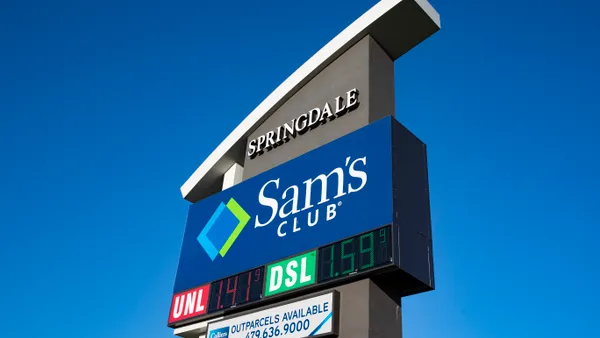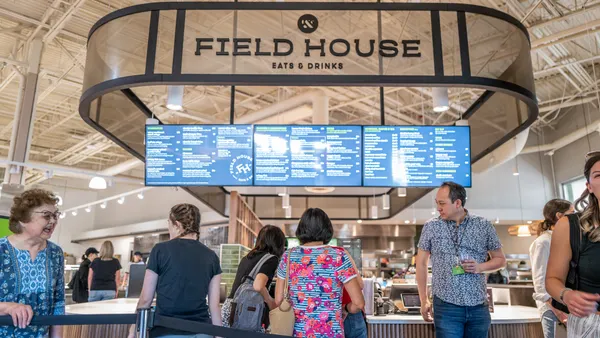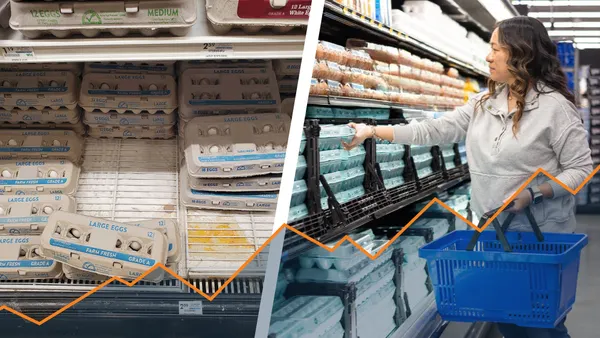Dive Brief:
- Millennials are expected to be the biggest spenders this holiday shopping season, according to Accenture's annual holiday shopping survey. More than half of millennials plan to spend as much as last year, and 36% say they will spend more. Millennials are four times more likely as baby boomers to spend more than last year (49% versus 13%).
- Consumers are willing to spend more on holiday gifts if they support retailers with a sense of responsibility, value, inclusion and diversity. In fact, 54% of younger millennials say they are more likely to give their money to retailers addressing social and political issues. And 70% of this same group will prefer a brand that demonstrates inclusion and diversity.
- Specific to grocery, 86% of those surveyed said quality is “important” or “very important” when making holiday food shopping decisions. More than half say they are likely to shop from a high-quality retailer and 48% are likely to buy premium brands instead of private labels. More than 80% of respondents ranked “trust in the provider and products” as a top-three deciding factor, followed by range of items at 78%, and convenience of the physical store at 69%.
Dive Insight:
Millennials are quickly becoming the strongest spenders in the grocery segment. These younger shoppers are now the largest generational demographic in the U.S., and they spend a larger percentage of their food budgets on prepared foods than other age groups — meaning grocers have a big opportunity to capitalize on creating catered and prepared meals for larger crowds.
This generation values quality as well as transparency about where their food originated. In a 2015 Nielsen survey, 66% of millennials said they were willing to pay more for sustainable products. So grocers should be looking to push items that are grown sustainably, as well as those produced locally to support the community.
Transparency also means a focus on real foods with few additives, if any. Retailers can play up any of these attributes by including in-store campaigns promoting technology such as QR codes for consumers to get additional information. In fact, a recent Food Marketing Institute study found that 72% of millennials indicated they were “somewhat to very likely” to scan a QR code to view more specific product details. More than 28,000 products participate in the Grocery Manufacturers Association's SmartLabel program and have QR codes on their packages that can provide shoppers with more information. GMA and FMI kicked off a coordinated marketing campaign to make consumers aware of the program this summer, and the holiday season could be the perfect time to ramp it up.
According to the Accenture survey, millennials are stepping up to be holiday hosts this year. There are 50% more people ages 21 to 27 planning to host Christmas meals or parties than baby boomers. And 62% of millennials say they are planning to host Thanksgiving.
“It’s positive to see millennials, with their significant purchasing power, taking a greater interest in hosting these important holiday meals at home,” Jill Standish, senior managing director and head of Accenture’s Retail practice, said in a press release. “And what an opportunity for grocery retailers to meet this generation of shoppers. If done right, it might be the start of a relationship that will last all year and beyond.”
CNBC reports that the average American will spend $97 on food or hosting expenses for Thanksgiving. Since so many millennials are hosting the November feast, grocers should promote products that target them. Members of this generation seem to favor ethnic cuisines, time-saving meal prep (think in-store meal kits) and craft beer.
Retailers looking to make the most of holiday spending should also be sure to beef up their loyalty perks in order to attract millennials. The programs that seem to resonate best with customers are ones that offer deals and coupons personalized to the shopper. The holidays are no different: Millennials will be looking for deals on cases of craft beer and fresh-cut veggies for that pre-Christmas bash.
One really effective loyalty program model could be following Hannaford's lead and offering cash-back incentives to shoppers. What could be more useful to holiday shoppers than extra money to spend?










